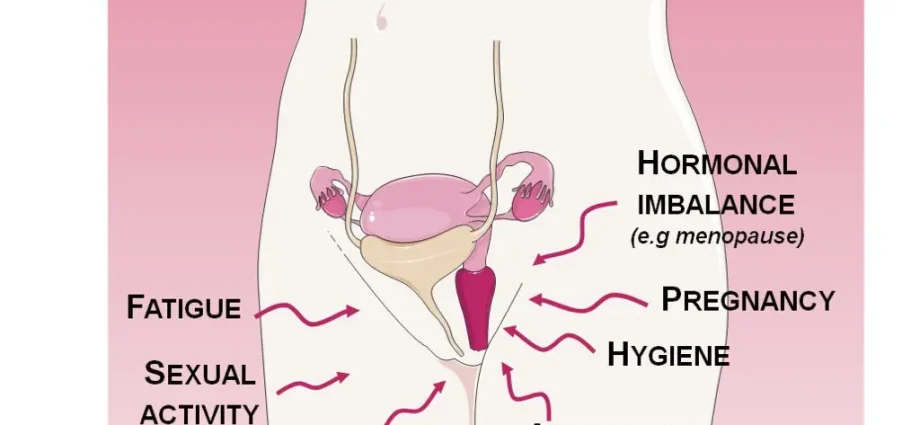Contents
Vaginal dryness: why it occurs and what is the treatment
Brigade women
Menopause, taking contraceptives or stress are common causes that can cause irregularities

When our mind goes one way and our body the other, it almost always leads to a frustrating situation. That, frustration, would be a good adjective to describe what surfaces inside when you suffer from vaginal dryness, a problem a priori not very important, but actually basic to the health of the female genitalia, and having sex.
Vaginal dryness can have many causes. Lorena Serrano, gynecologist, and part of the Catalan Health Institute team, says that the first thing to keep in mind is that vaginal discharge depends on the action of estrogens, so that all those situations that cause a decrease in estrogen levels
they will cause vaginal dryness. The most common is the arrival of menopause, explains Dr. María Fasero, from the Healthy Menopause Unit of the Sanitas La Zarzuela University Hospital, although she points out that there are other situations that cause a decrease in estrogens and that if it lasts over time they can cause vaginal dryness. These situations can be, explains Dr. Fasero, breastfeeding, taking contraceptives or, for example, during radiotherapy at the level of the lower genital tract, or in treatments in which anti-estrogenic drugs are used, such as breast cancer. “On the other hand, there are unhealthy habits such as smoking that can also cause vaginal dryness, in addition to which it can advance menopause,” he adds.
Other causes
«Also certain treatments such as antidepressants or antihistamines have been associated with a decrease in normal vaginal lubrication. And finally, we also know that all those excessive cleaning habits of our genitals – such as vaginal douches, soaps, etc.- can alter the vaginal microbiota, causing an alteration in the production of lubrication », summarizes Dr. Serrano.
Dr. José Vidal, head of the Women’s Unit at the Ruber International Hospital, explains that the most frequent is usually a hormonal disorder, but it is important to take into account both vaginal infections and psychological disorders. Regarding the first, the health of our microbiota comes into play, since, the doctor points out, “if the normal vaginal flora is altered by any cause, be it infectious, hormonal or traumatic, it can cause vaginal dryness.” Dr. Serrano comments that, if our estrogen level is adequate, the normal microbiota of the vagina presents some microorganisms (lactobacillus) that make the vagina have an acid PH and thus avoid being “colonized” by pathogenic microorganisms. It is, when this level of estrogens decreases, when these microorganisms decrease in quantity and causes other microorganisms to increase, producing discomfort such as vaginal dryness.
What if the psychological cause?
Sometimes our body “is in order” and it is our brain that plays tricks on us. The sexologist Ruth González Ousset explains that there are many psychological reasons that can lead to vaginal dryness. “It may be because we do not feel good with our own body, because we are angry with our partner, because we are sad or stressed, because we do not accept ourselves as we are …”, the professional lists.
Comment that the human sexual response has five phases: desire, excitement, plateau, orgasm and resolution. And that, when one of these fails, a consequence may be the lack of vaginal lubrication. “If we are very stressed, or sad, it will be difficult for us to feel desire, so we will not get to the arousal phase ‘well’ and, therefore, we will experience dryness,” he explains.
Another problem that can be found is to go “in a loop”, that is, that the moment comes when the cause of vaginal dryness is the very stress that causes us to experience it. «The brain plays us, in general tricks. In these cases it is important to drink water before having sex, to stay hydrated, and use lubricants. There is no need to be ashamed of resorting to them: they are very common, and relationships are much more pleasant that way, “says the professional.
Likewise, it encourages all women who do not find a quick solution to go for a consultation because, although it seems like a minor problem, vaginal dryness is not, and it can be very annoying.
Although generally experiencing vaginal dryness is uncomfortable, these discomforts are increased when having sexual intercourse. “The lack of that natural lubrication of the vagina will lead to discomfort and even pain with penetration. This is common in menopause where sometimes you enter a vicious circle that ends up avoiding relationships altogether, “explains Dr. Lorena Serrano. List various options to improve the situation: from lubricants, gels or creams with or without estrogens, hyaluronic acid suppositories, to essential oils… «I recommend starting with water-based lubricants. If these measures are not enough, it is best to speak with your gynecologist to rule out other pathologies and find an appropriate treatment adapted to each of you “, explains the professional.
Tips to avoid vaginal dryness
Finally, Dr. María Fasero gives some tips to maintain good vaginal health. The first is easy: healthy lifestyle habits, such as playing sports, not smoking, controlling weight, blood pressure and cholesterol. «Appropriate treatments can also be used for vaginal dryness prescribed by qualified personnel; there are many and very good ones and each woman should choose the one that best suits her needs and if there is an associated psychological-sexual problem, she should go to specialists in sexology, “says the doctor.
It also specifies that, during the menopause, having sex is considered one of the treatments for vaginal dryness. «Not only from the psychological point of view, but from the physical point of view; These small microtrauma that occur during intercourse can stimulate the formation of new blood vessels and collagen fibers that improve the elasticity of the vagina and vaginal discharge, “he concludes.










